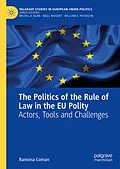Its rule of law crisis, the European Union could solve it on its own. In her thought-provoking book, Ramona Coman shows why the EU is largely failing in this enterprise. Analysing the politics of the rule of law of the political EU institutions and of civil society, but leaving out the Court, Coman traces the roots of the current age of dissensus. Whether the reliance on conditionality rather helps or harms for the future, one wonders. Highly recommended reading!
- Susanne K. Schmidt, University of Bremen, Germany
Ramona Coman's timely book is the first monograph to provide a comprehensive overview of the recent evolution of the EU's rule of law policy instruments designed to address the dismantling of core aspects of liberal democracy. Coman's compelling narrative of the politics surrounding the evolution of the policy makes an important contribution to the highly topical debate and growing literature on the EU's ability to address democratic backsliding among its members.
- Ulrich Sedelmeier, London School of Economics and Political Science, UK
This book analyses how an increased contestation of the rule of law has given rise to heightened tensions between national and European institutions over the last few decades, and how this has led to the establishment of soft and hard policy tools to safeguard this value in the EU polity. It demonstrates how a clash between liberal and anti-liberal ideas and dissensus over how collective problems should be solved has led to European integration in core state powers. It also considers how this has taken place in a community of voices featuring assent and dissent, all of which give democracy its substance. The book helps readers to better understand the EU's fragilities and challenges.
Ramona Coman is Professor of Political Science at the Université libre de Bruxelles, Belgium, where she is also President of the Institut d'études européennes.
Autorentext
Klappentext
This book analyses the challenges facing the European Union through the frame of the rule of law. It shows how over the last decades the increased dissensus and contestation of the rule of law has given rise to heightened tensions between national and EU institutions, leading to the establishment of new soft and hard policy tools to safeguard it at the supranational level. The book proposes a comprehensive and multifaceted analysis of the current state of debates by exploring how EU institutional actors seek to uphold the Union's values. It shows that European integration in core state powers is the outcome of the clash between liberal and anti-liberal ideas, between dissensus and contestation over how collective problems should be solved, in a community of voices featuring assent and dissent, all of which give democracy its substance. Beyond the analysis of the emerging EU's rule of law policy, the book will help readers to better understand the EU's fragilities and resilience and the potential challenges for the future of EU integration.
Inhalt
1. Introduction-The rule of law in the EU polity: from consensus to dissensus.- 2. Democracy and the rule of law in the European Union polity.- 3. The rule of law at risk in EU member states.- 4. The European Commission: a powerful policy entrepreneur in strengthening the EU's expert legitimacy?.- 5. The European Parliament in defence of European values: how deep is the East-West divide?.- 6. The silence of Ministers: towards a more intergovernmental EU?.- 7. The Court of Justice of the EU: in the courts we trust?.- 8. The social foundations of the rule of law: towards increased social legitimacy?.- 9. The challenges of strengthening the rule of law at the supranational level.
